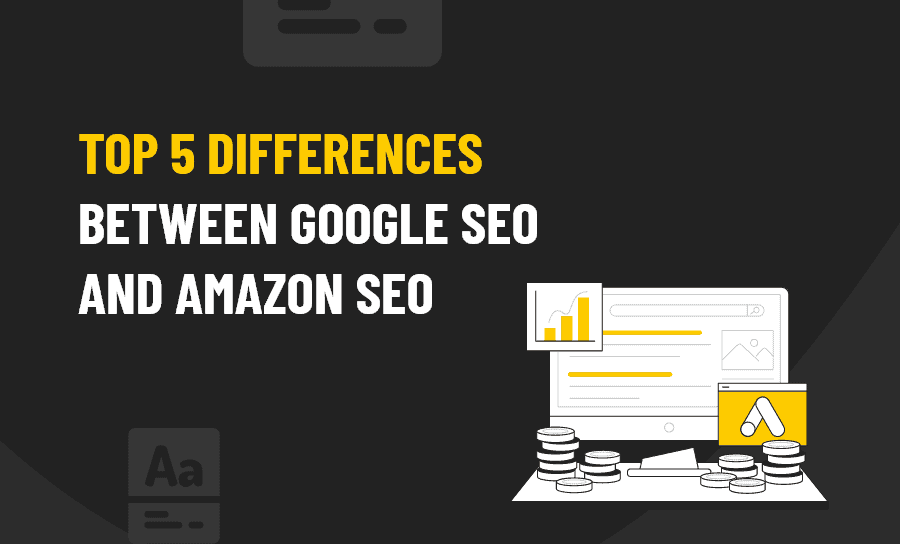Do you sell online? Do you have a website and an Amazon storefront? If so, then this post is for you.
Many vendors wonder if, for both Google and Amazon, they should use the same SEO techniques. Although they are both search engines based – in part – on keyword rankings, they are extremely different. So the basic answer is no.
Why? Became the two search algorithms used are very different.
Google wants to deliver the best possible answer to a searcher’s question with the most valuable information. The algorithm is then focused on website content, online credibility, the authority of the webpage, page quality, and mobile-friendliness. It takes a lot into account and gets very granular. There are more than 200 different ranking factors taken into consideration.
The backbone of the Amazon algorithm – known as A9 – is identifying the needs of shoppers and showcasing the items that searchers are most likely to buy. That’s it. Reputation etc. still matters (as we’ll get to later) but in a very different way.
While there are probably more differences, you will need to take into account as you build a more robust, long term SEO strategy for both your e-commerce website and your Amazon store and Amazon listings here we are going to take a closer look at the five most important.
Keyword Density and Repetitions
External Traffic Benefits
For Google SERPs ranking, driving external traffic to your pages counts a lot. For Google, the more online sources make reference to your content, the better, because it means that your websites are helpful, engaging and serving the community.
Your quality content is read and valuable, trusted and shared. Google loves that and will reward you in the SERPs for taking the time to cultivate genuine organic external traffic. So, for your website content, it’s something to put some considerable effort into.
Since its algorithm doesn’t provide backlinks, Amazon is a different story. The “life” of your listings outside Amazon is not rewarded in terms of search visibility in any way, because Amazon simply does not care where your traffic came from. They really only care how many of the browsers landing on your page convert into customers.
You can, and quite possibly should, promote your Amazon product listings elsewhere and those promotions may lead to increased conversions and more feedback, so there is a possible positive impact to be gained from external links, but it’s indirect, and Amazon is not involved.
Clicks Versus Conversions
Another big difference between Google SEO and Amazon SEO exists because their search engines – and the companies’ purposes – are so very different.
Google exists to inform. Yes, they sell ads too, but that’s not a part of their organic SERPs algorithm. To maintain their own search reputation, they reward content that is visited often, and that users take the time to read. They reward websites if visitors click to – and then stay on – other pages.
What your website users do, how long they stay and how often they come back are all important SEO factors for Google. Again, Amazon couldn’t care less.
A dozen customers could visit your Amazon listing a dozen times, and stay on the page, reading everything, for twenty minutes each time, but that won’t help you gain more visibility in Amazon search. Only a purchase, or after a purchase, a positive review, will do that.
Key Phrase Differences
You have probably heard or read – we’ve certainly covered this here before – that long-tail keywords are increasingly important in Google SEO. And that’s absolutely true. As Google’s bots are getting smarter and smarter, and search engine queries that are very semantic in nature are getting answered far more accurately, you can do very well in the SERPs with long-tail keywords and keyphrases.
Answering questions is becoming increasingly important in terms of Google SEO too. As searchers get used to the fact that the search engines now understand them a lot better, they have been increasingly searching with question terms (i.e., “where can I find great pizza near me” instead of terms like “pizza in Xtown” that they probably used in the past. The increase in the number of voice searches being made is adding to the importance of these tactics too.
Amazon search is not like that. When people go to Amazon, they know that they simply need to input the product name or product class, they are looking for to get their answer fast. So short tail keywords still rule on Amazon. Long-tail keywords are rarely used by Amazon users, so focusing on those would be a waste of time.
External Traffic Benefits
The simple fact is that the Google search algorithm can, to a certain degree, be manipulated when it comes to e-commerce. In fact, that’s a big part of SEO. We don’t mean by doing shady things – Google will penalize you for them – but by the things you do around your products.
For example, let’s imagine that both you and a competitor offer a certain type of jeans. You implement tactics like ensuring your on-page SEO is on point, that you target the right keywords, you maintain a blog that is relevant to the consumers that are likely to be looking for those jeans. In a nutshell, you work on your SEO.
Your competitors don’t. Or they do bad, shady SEO things like buy links. Or have terrible content that has been scraped from all over the web (badly). The result will usually be that your products will quickly overtake theirs in the SERPs.
However, over on Amazon, they – and therefore their A9 search algorithm – cares only about the success of products, consumer feedback, brand credibility and customer service. No SEO specialist, however talented, can rank a poor product higher than a popular, higher-quality item. They can certainly help you rank above a similar item, but they can’t, to be very blunt, make a silk purse out of sow’s ear.
Finding Someone Who Can Do It All
If you have made it this far, you now understand how different Google SEO and AMAZON SEO are. So, we assume, you also now understand the importance of implementing two quite different SEO plans for the two different platforms.
There are, as you may already know, lots of good reasons to sell from both your standalone website and as a third party seller on Amazon. As big as it has become not everyone shops on Amazon. In fact, there are consumers who avoid it at all costs. These are the consumers you need to target with your website, and the best way to do that is to generate lots of high-quality traffic via SEO.
Amazon, however, thanks to its vast reach, and the fact that Googling the word ‘Amazon’ now directly brings up the site, rather than the large river as it did a decade ago, means that third-party sellers have instant access to a captive audience. Their job there is to offer a great product and a great customer experience. Jeff Bezos and Co. do most of the traffic generation for you.
There are still many SEO practitioners, and SEO agencies, that have yet to understand this. So, if you work with them, they’ll keep making use of the same old SEO stuff they always have for both your Amazon and Google platforms, often because they simply don’t know any better because they haven’t taken the time to learn about the differences between the two.
That’s why (here’s the toot our own horn bit) anyone selling both from a website and Amazon needs a multitalented team like the Pearl Lemon SEO team. Not only do we understand the difference between Google SEO and Amazon SEO, but we also understand how to make the two work together seamlessly, helping you get both to Google’s first page and featured as an Amazon’s Choice. Contact us today to discuss how we can put all this expert knowledge to work for you.








